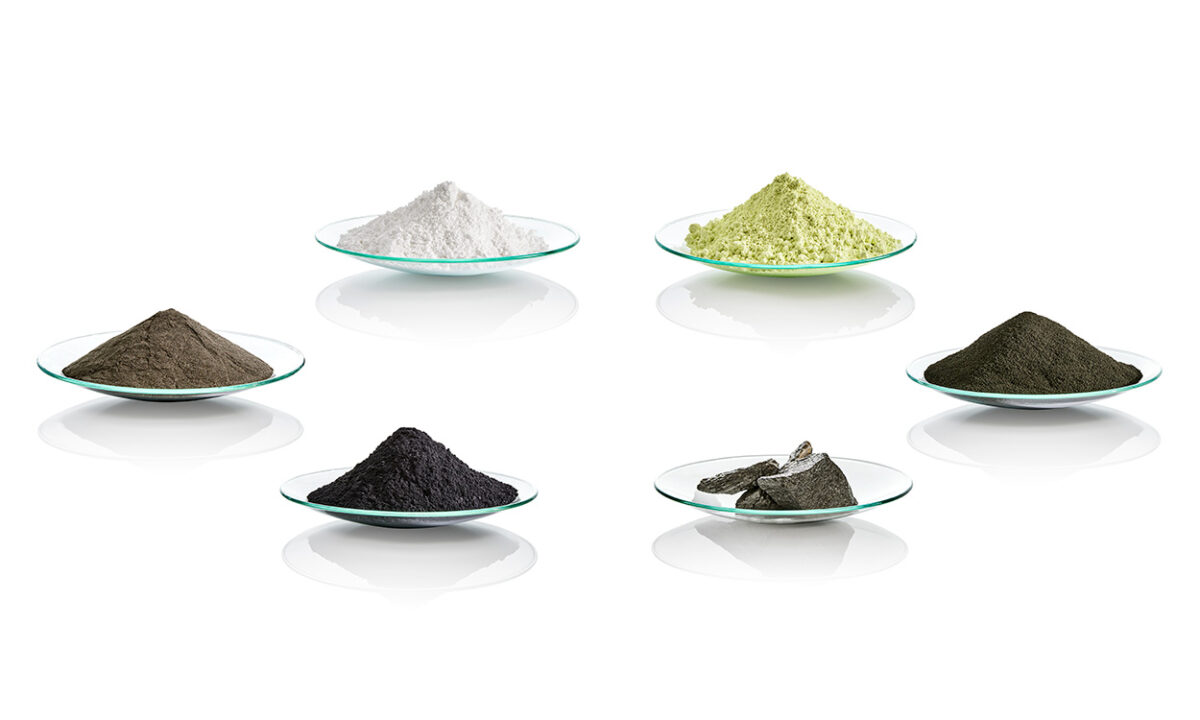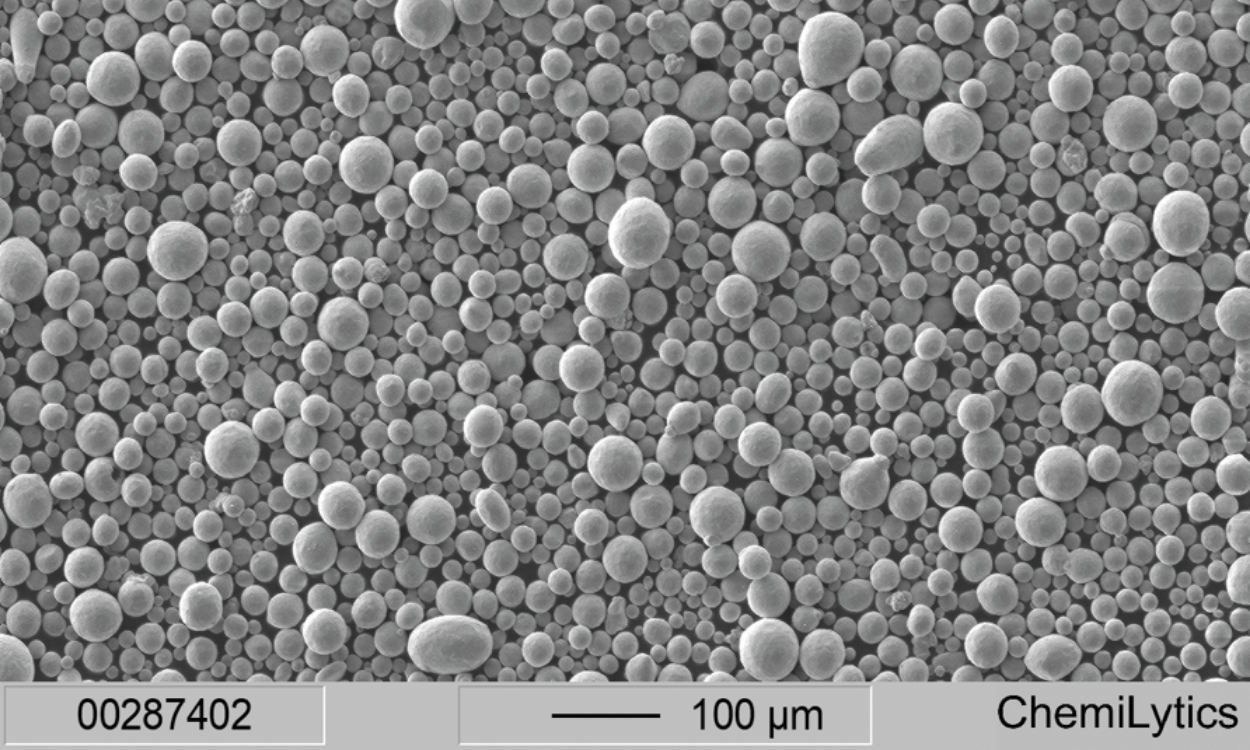TANIOBIS GmbH collaborates with Volkswagen-led research team to advance battery-recycling technology
TANIOBIS GmbH and Partners from the industrial and scientific communities want to jointly prove that the most valuable components of traction batteries can be recovered and reused several times in succession through recycling. The “HVBatCycle” research consortium aims to keep cathode metals, electrolyte and graphite permanently in a closed material cycle. Under the leadership of the Volkswagen Group, TANIOBIS GmbH, J. Schmalz GmbH, Viscom AG have been working together with researchers from RWTH Aachen University, TU Braunschweig and the Fraunhofer Institute for Surface Engineering and Thin Films for three years to research and develop the necessary processes. The project is funded by the Federal Ministry for Economic Affairs and Climate Action.
Michael Kellner, Parliamentary State Secretary, states: “European battery production can only be successful if it focuses on sustainability in as many areas as possible. Sustainable batteries are crucial for an energy and transport transition that is guided by high environmental and social standards.”
Sebastian Wolf, Chief Operating Officer Battery Volkswagen AG, explains: “The recycling of batteries and production rejects makes a decisive contribution to securing the supply of raw materials for our planned factories. Through the HVBatCycle project, a holistic view of the recycling processes and thereby the implementation of the closed loop of battery materials is being prepared.”
TANIOBIS also sees a lot of potential in the project, as Kazuhiko Iida, CEO of TANIOBIS GmbH states: “We are honored to make a collaboration partnership with trustworthy partners in the LiB recycling business. Through this partnership between industry, government, and academia, JX Metals group aims at early commercialization of LiB recycling.” Dr. Shizuo Sugawara, Deputy CEO of JX Nippon Mining and Metals says that with this project, the JX Metal group takes a further step to develop the early commercialization in the EU region, where industry, government, and academia are proactively accelerating EV shift. He also explains: “JX Metals group has been working on the development of recycling technology to establish “closed-loop recycling”, the circular process to recycle valuable metals from used LiBs to the raw materials for new ones, and our group has already developed the technology that can extract metallic salts for raw materials of LiBs.” To sum up the importance of the collaboration, Dr. Kazuyuki Marukawa, Vice Chairman of TANIOBIS GmbH and CEO of JX Metals Circular Solutions Europe GmbH, adds: “We unitedly contribute to the success of the project. We will newly establish a hydrometallurgical plant for the upcoming R&D based upon our technologies in Goslar, where TANIOBIS operates its main facility. In this project, we play a key role to optimize the recycling processes to recover the high-quality materials with high yields, inputting black mass (pulverized batteries) provided by Volkswagen AG. Starting up with EU and Germany together with Volkswagen-led research team, JX Metals group will globally contribute to the early spread of EVs which are indispensable for the realization of a carbon-free society and the realization of a resource-recycling society through the foregoing efforts.”
Closed raw material cycle and multiple recycling
In order to have to use fewer materials from primary sources such as mines or salt flats, essential raw materials are to be recovered not just once, but several times. To this end, battery cells made from recycled material are recycled again, thereby also proving that even multiple recycling runs have no influence on the material quality. Closing the loop requires complex interdisciplinary processes. For efficient and ecologically and economically sensible recycling, all processes must be coordinated with each other in order to produce sorted and high-quality secondary materials under the highest safety requirements. This is about scalability and economic efficiency in particular.
Advantages through the use of secondary materials
The consortium project focuses on the mechanical-hydrometallurgical recycling route, which is characterized by low energy requirements. The “HVBatCycle” project is intended to show efficient processes and innovative solutions that ensure the development of an end-to-end value chain with high profitability and at the same time the highest possible recycling and energy efficiency and minimal environmental pollution.
Automation of the dismantling processes and recovery of the electrode material
Concrete innovative development approaches lie in a demand-oriented – that is, economically optimised – discharge and a largely automated dismantling of declining battery systems down to cell or electrode level. This also includes an almost loss-free separation of active material and carrier foils as well as the recovery of graphite and highly volatile electrolyte components.
In the following hydrometallurgical processing of the “black mass”, which consists of graphite and battery metals, using water and chemical solvents, the focus is on early and selective extraction of the lithium in soluble form as well as leaching, precipitation and refining of contained metals as a mixed hydroxide concentrate. Here, in connection with the renewed material synthesis of cathodic active material, it will be investigated whether the separation of metal compounds is really necessary to produce new, fully high-performance cathode material.
The research work on the processing of the electrolyte and the graphite is intended to show, through the development of suitable processes, that important electrolyte components and the graphite can also be efficiently processed and used again in battery-suitable quality in cell production. All process steps are holistically accompanied by an ecological and economic life cycle analysis.
About the cooperation partners:
- As part of its battery strategy and its sustainability strategy, Volkswagen AG is very interested in the realisation of a closed loop of cell materials and has therefore taken on the coordination and management of the project. With the pilot plant for mechanical recycling at the Salzgitter components site, the Group’s Technology division ensures the production and supply of recyclable material from vehicle batteries. In addition, the cell manufacturing expertise of the Centre of Excellence in Salzgitter is used to produce new cells from fully recycled material.
- TANIOBIS GmbH is a quality supplier of powders containing niobium and tantalum for hydrometallurgical manufacturing processes including solvent extraction. As a subsidiary of JX Nippon Mining & Metals, it has in-depth knowledge of hydrometallurgical recycling of lithium-ion batteries, which will be applied in the project. Based on this, TANIOBIS GmbH will build and operate the required hydrometallurgical and pyrometallurgical infrastructure at the Chemiepark Oker site.
- J. Schmalz GmbH is the world’s leading supplier of vacuum technology and one of the few full-range suppliers in this field. In the vacuum automation business segment, Schmalz supplies all the vacuum components needed to assemble grippers for industrial robots. In addition, sensor technology from Schmalz ensures process efficiency and safety. In joint projects with scientific institutes, handling systems for silicon wafers and cathode and anode foils were established.
- Viscom AG develops X-ray measurement solutions specifically for use in the battery cell industry. The product portfolio ranges from laboratory systems to complete inline solutions for 100% quality control at high speeds. Viscom specialises in a variety of different cell formats, such as pouch or prismatic cells, covering different sizes for consumer products through energy storage to e-mobility cells.
- The Battery LabFactory Braunschweig (BLB), as an established transdisciplinary research centre of the TU Braunschweig, is one of the leading institutions in the field of battery research in Germany. The BLB is an R & D platform for circular production, diagnostics and modelling/simulation of batteries of the current and future generations. In its pilot plant, the BLB combines engineering process know-how, materials science expertise, battery cell system knowledge from the natural sciences and sound analytical skills.
- The Institute of Machine Tools and Production Technology (IWF) focuses on technological and automation issues along current and future manufacturing process chains for battery cells.
- The elenia Institute for High Voltage Technology and Power Systems has extensive experience in the field of formation, cyclic ageing and the electrical and electrochemical characterisation of battery cells.
- At the Institute for Particle Technology (iPAT), mechanical and particle technology processes for the production of battery materials and electrodes as well as mechanical and thermal processes for battery recycling are investigated.
- The Institute of Chemical and Thermal Process Engineering (ICTV) has broad expertise in the separation of fluid mixtures.
- The Institute of Energy and Process Systems Engineering (InES) has many years of experience in the modelling and simulation of batteries as well as electrochemical analysis and operando analytics.
- The Fraunhofer Institute for Surface Engineering and Thin Films (IST) conducts intensive research and development in the areas of material synthesis and functionalisation, surface treatment and modification, film production and application, film characterisation and surface analysis, as well as in the field of production technology. As a central topic at the Fraunhofer Project Center for Energy Storage and Management Systems (ZESS), battery research focuses on material and energy storage development, including associated process and manufacturing technologies as well as the holistic and sustainable design of the life cycle.
- The Institute for Metallurgical Process Engineering and Metal Recycling (IME) at RWTH Aachen University has many years of experience in application-oriented research into battery recycling processes. The research focus here is on recovering the valuable metals contained in batteries using thermal and hydrometallurgical processes. The institute has a comprehensive infrastructure for testing various recycling concepts, which also includes an innovative pyrolysis furnace from Otto Junker GmbH for processing larger quantities or entire battery modules. Through its in-house certified laboratory, the IME has access to many important analytical methods that are needed in the investigation of possible battery recycling processes.




